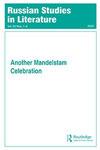下载PDF
{"title":"俄罗斯及其他人:文学身份的演变","authors":"Sibelan E. S. Forrester","doi":"10.1080/10611975.2017.1503485","DOIUrl":null,"url":null,"abstract":"Russia’s literature, like that of any country, is shot through with issues of identity, including contested ways of being ethnically Russian and the discourse concerning the large variety of non-Russian ethnicities with various levels of legal and linguistic status. English unfortunately lacks a term for “rossiiskii,” meaning “a citizen of the Russian Federation” without regard to that person’s ethnic background, despite the importance of distinguishing Russian (ethnic, linguistic) from “in Russia.” The lack of a distinguishing term in English might suggest the international success of projects of Russification, though again it could just reflect a sloppiness like the one that often used “Russian” as a comfortable, more familiar synonym for “Soviet.” This issue of Russian Studies in Literature offers some reflections on the verbal interactions among different groups in Russia and the sometimes vexed but often productive relationships between Russia and its Others. In the three articles here, those Others are a group of Central Asian authors with a creatively cosmopolitan orientation, a Jewish writer and a Tatar writer interacting with conservative Russian authors and literary positions, and writers of Adyghe literature as it emerges into the contemporary world, though at risk of losing its own linguistic specificity. Two of the articles in this issue are drawn from a special February 2017 issue of NLO (the New Literary Review) dedicated to the question of imperial identity and the ways the mythologemes and ideologemes of imperial consciousness are reflected in current Russian Russian Studies in Literature, vol. 53, nos. 3–4, 2017, pp. 201–204. © 2017 Taylor & Francis Group ISSN: 1061-1975 (print)/ISSN 1944-7167 (online) DOI: https://doi.org/10.1080/10611975.2017.1503485","PeriodicalId":55621,"journal":{"name":"RUSSIAN STUDIES IN LITERATURE","volume":"53 1","pages":"201 - 204"},"PeriodicalIF":0.0000,"publicationDate":"2017-10-02","publicationTypes":"Journal Article","fieldsOfStudy":null,"isOpenAccess":false,"openAccessPdf":"https://sci-hub-pdf.com/10.1080/10611975.2017.1503485","citationCount":"0","resultStr":"{\"title\":\"Russia and Its Others: Evolving Identity in Literature\",\"authors\":\"Sibelan E. S. Forrester\",\"doi\":\"10.1080/10611975.2017.1503485\",\"DOIUrl\":null,\"url\":null,\"abstract\":\"Russia’s literature, like that of any country, is shot through with issues of identity, including contested ways of being ethnically Russian and the discourse concerning the large variety of non-Russian ethnicities with various levels of legal and linguistic status. English unfortunately lacks a term for “rossiiskii,” meaning “a citizen of the Russian Federation” without regard to that person’s ethnic background, despite the importance of distinguishing Russian (ethnic, linguistic) from “in Russia.” The lack of a distinguishing term in English might suggest the international success of projects of Russification, though again it could just reflect a sloppiness like the one that often used “Russian” as a comfortable, more familiar synonym for “Soviet.” This issue of Russian Studies in Literature offers some reflections on the verbal interactions among different groups in Russia and the sometimes vexed but often productive relationships between Russia and its Others. In the three articles here, those Others are a group of Central Asian authors with a creatively cosmopolitan orientation, a Jewish writer and a Tatar writer interacting with conservative Russian authors and literary positions, and writers of Adyghe literature as it emerges into the contemporary world, though at risk of losing its own linguistic specificity. Two of the articles in this issue are drawn from a special February 2017 issue of NLO (the New Literary Review) dedicated to the question of imperial identity and the ways the mythologemes and ideologemes of imperial consciousness are reflected in current Russian Russian Studies in Literature, vol. 53, nos. 3–4, 2017, pp. 201–204. © 2017 Taylor & Francis Group ISSN: 1061-1975 (print)/ISSN 1944-7167 (online) DOI: https://doi.org/10.1080/10611975.2017.1503485\",\"PeriodicalId\":55621,\"journal\":{\"name\":\"RUSSIAN STUDIES IN LITERATURE\",\"volume\":\"53 1\",\"pages\":\"201 - 204\"},\"PeriodicalIF\":0.0000,\"publicationDate\":\"2017-10-02\",\"publicationTypes\":\"Journal Article\",\"fieldsOfStudy\":null,\"isOpenAccess\":false,\"openAccessPdf\":\"https://sci-hub-pdf.com/10.1080/10611975.2017.1503485\",\"citationCount\":\"0\",\"resultStr\":null,\"platform\":\"Semanticscholar\",\"paperid\":null,\"PeriodicalName\":\"RUSSIAN STUDIES IN LITERATURE\",\"FirstCategoryId\":\"1085\",\"ListUrlMain\":\"https://doi.org/10.1080/10611975.2017.1503485\",\"RegionNum\":4,\"RegionCategory\":\"文学\",\"ArticlePicture\":[],\"TitleCN\":null,\"AbstractTextCN\":null,\"PMCID\":null,\"EPubDate\":\"\",\"PubModel\":\"\",\"JCR\":\"Q4\",\"JCRName\":\"Arts and Humanities\",\"Score\":null,\"Total\":0}","platform":"Semanticscholar","paperid":null,"PeriodicalName":"RUSSIAN STUDIES IN LITERATURE","FirstCategoryId":"1085","ListUrlMain":"https://doi.org/10.1080/10611975.2017.1503485","RegionNum":4,"RegionCategory":"文学","ArticlePicture":[],"TitleCN":null,"AbstractTextCN":null,"PMCID":null,"EPubDate":"","PubModel":"","JCR":"Q4","JCRName":"Arts and Humanities","Score":null,"Total":0}
引用次数: 0
引用
批量引用
Russia and Its Others: Evolving Identity in Literature
Russia’s literature, like that of any country, is shot through with issues of identity, including contested ways of being ethnically Russian and the discourse concerning the large variety of non-Russian ethnicities with various levels of legal and linguistic status. English unfortunately lacks a term for “rossiiskii,” meaning “a citizen of the Russian Federation” without regard to that person’s ethnic background, despite the importance of distinguishing Russian (ethnic, linguistic) from “in Russia.” The lack of a distinguishing term in English might suggest the international success of projects of Russification, though again it could just reflect a sloppiness like the one that often used “Russian” as a comfortable, more familiar synonym for “Soviet.” This issue of Russian Studies in Literature offers some reflections on the verbal interactions among different groups in Russia and the sometimes vexed but often productive relationships between Russia and its Others. In the three articles here, those Others are a group of Central Asian authors with a creatively cosmopolitan orientation, a Jewish writer and a Tatar writer interacting with conservative Russian authors and literary positions, and writers of Adyghe literature as it emerges into the contemporary world, though at risk of losing its own linguistic specificity. Two of the articles in this issue are drawn from a special February 2017 issue of NLO (the New Literary Review) dedicated to the question of imperial identity and the ways the mythologemes and ideologemes of imperial consciousness are reflected in current Russian Russian Studies in Literature, vol. 53, nos. 3–4, 2017, pp. 201–204. © 2017 Taylor & Francis Group ISSN: 1061-1975 (print)/ISSN 1944-7167 (online) DOI: https://doi.org/10.1080/10611975.2017.1503485


